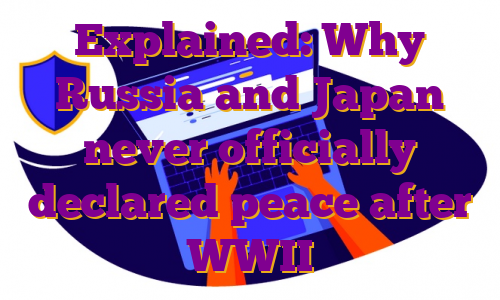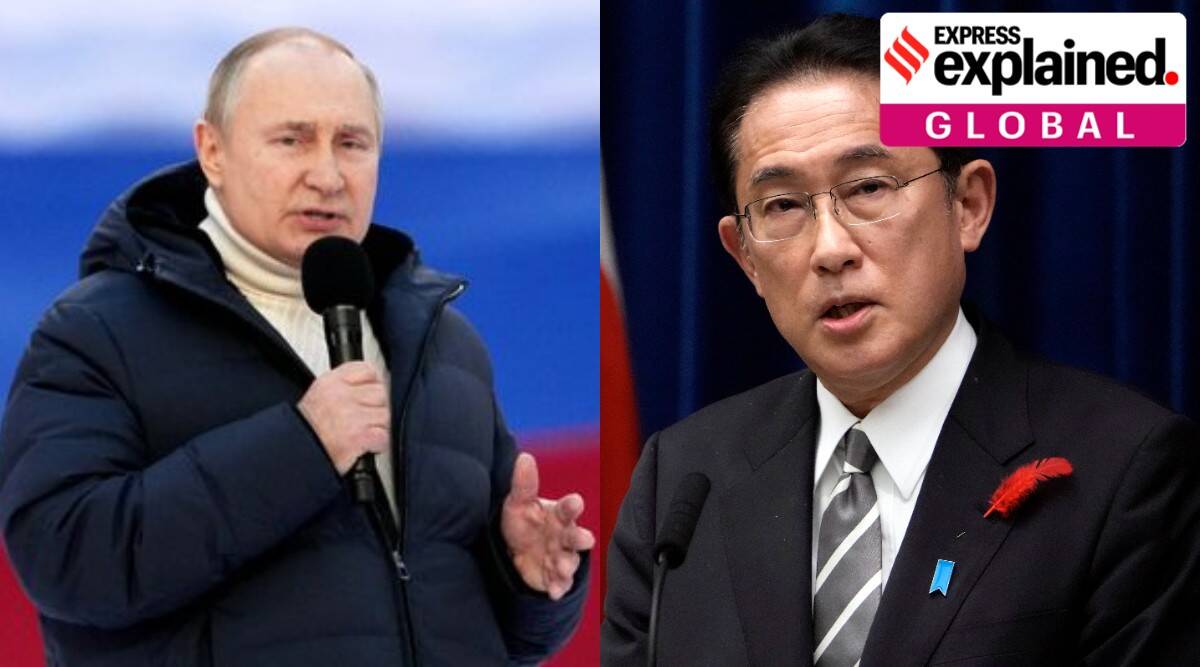Subscribe Now: Get Express Premium to access the best Election reporting and analysis
While many people were expecting this of Germany from the outset, over the last 70 years it has been a marginal military power, adopting a post-war identity of pacifism. In 2016, Frank Steinmeier, Germany’s Foreign Minister at the time, wrote an article for Foreign Affairs Magazine outlining the rationale behind such an approach. He states that, “since Germany sits at the center of Europe, neither isolation nor confrontation is a prudent policy option. Instead, Germany tries to use dialogue and cooperation to promote peace and end conflict.”
Pacifism has been the underlying doctrine behind German foreign policy since the Second World War and the fact that Berlin has finally decided to change course, speaks volumes to the gravity of Putin’s actions.

Germany since World War II
German troops have mainly been involved in peacekeeping missions since 1945, with notable exceptions being their participation in the Balkan Wars of the 1990s and in the invasion of Afghanistan in 2001. This muted approach is favoured by both policymakers and the public, with annual surveys consistently revealing that most Germans believe diplomatic relations are the best tools to resolve conflict. One caveat that is worth mentioning, and that has come under significant scrutiny, is that despite its pacifist bent, Germany is the third largest arms exporter in the world, although its output is dwarfed by Russia and the US.


Germany’s reluctance to embroil itself into international conflicts, stems from its deep national shame over its actions during the two World Wars. When Adolf Hitler’s Third Reich collapsed in 1945, reminders of his reign were hastily scrubbed away. Even today, denying German complicity in the Holocaust is a punishable offence in the country, and until recently, Hitler’s magnum opus, Mein Kampf, was forbidden from being sold in German bookstores. In the rubble of the War’s aftermath, Germany began the slow and difficult process of rebuilding itself as a nation while remaining cognizant though weary of its complicated past.
Germany was aided in this endeavour by the Allied Nations — the US , the UK, Russia, and France. In the years following the capitulation of the Nazi regime, the German military was thoroughly disbanded, with France in particular, having been invaded by Germany twice in the 20th century alone, adamantly in favour of German demilitarisation. In 1952, following the onslaught of the Cold War, Germany was divided into two federal republics, with West Germany under the control of the US and its allies, and East Germany under Soviet occupation.
Realising that Germany was a key point of defence for the West, grudgingly, in 1955, it was granted its own army, although it served only as a deterrent against the Soviet Union. That same year, Germany joined NATO and gradually proceeded to rearm the Bundeswehr, which was later described by Cold War historian, John Lewis Gaddis, as “perhaps (the) world’s best army.” For years, the two German Republics were constantly at loggerheads, with both competing to establish a collective German national identity based on conflicting ideologies. That changed when West Germany’s Chancellor, Willy Brandt, implemented a foreign policy known as Neue Ostpolitik, aiming to improve Bonn’s relations with the Soviet Union and its allies, under the banner of change via rapprochement.
Ostpolitik would loom large over the next few decades, with its watershed moment occurring in 1975, during the Helsinki Conference. The resulting ground-breaking agreement, involving concessions from both the Eastern and Western blocs, would later be credited with playing an important role in the elimination of communism in Europe.
However, since the passage of the Helsinki Act, Germany’s Ostpolitik has undergone a significant shift. Whereas human rights provisions had previously played a crucial role in Germany’s approach to Moscow, Brandt’s successor, Helmut Schmidt, interpreted the doctrine to be more along the lines of non-interference. Schmidt maintained that Germany’s strategic goal must be to maintain peace via good relations with all governments, including those with questionable human rights records. Subsequently reproachment through trade has been the cornerstone of German foreign policy.
Since the end of the Cold War, Germany has been directly involved in only two conflicts, notably remaining absent from the US invasion of Iraq. However, it still remained a veritable diplomatic and economic force in its own right. Germany provided the third largest contingent of troops to Afghanistan, accepted over a million Middle Eastern refugees after the Arab Spring, negotiated the Minsk Agreement between Ukraine and Russia following the latter’s annexation of Crimea and was a key supporter of the Iran nuclear deal.
As the US reeled from the effects of the Iraq War, Germany went from being the sick old man of Europe to the statesman of the free world. Through all of this, it continued to favour diplomacy over militancy and as such, maintained good working relationships with the unlikely trio of Washington, Moscow, and Beijing. Due to its ability to juggle the interests of competing nations, Foreign Policy columnist Stephen Walt argued that Germany deserved to win the 21st century “gold medal” for foreign policy.
Germany and Russia
Along with Berlin’s post-war commitment to pacifism, it also has a host of economic and security concerns that influences its relationship with Moscow.
The most important factor, and one which is often referred to, is Germany’s reliance on Russia to meet its energy needs. Russia provides 27% of Germany’s energy supply, accounting for two thirds of its natural gas consumption. Even at the height of the Cold War, Russia had always been a reliable source of gas for Germany, but the current German Finance Minister has warned that this could change if Scholtz attempts to punish Russia for its actions in Ukraine.
Were Moscow to shut off the pipes, the economies of Germany, and the rest of Europe, could be massively derailed. Energy prices have already skyrocketed since the invasion and there are very few short-term measures that can rectify Russia’s energy monopoly over Europe. In the event of a prolonged conflict, tougher Western sanctions and disruptions to Russia’s oil and gas exports would deliver an even bigger energy shock, possibly even resulting in a European recession.
Germany also has high trade volumes with Russia. According to 2019 data, Germany exports $30 billion to Russia and imports $19 billion. Moreover, given that the value of trade with Russia exceeded $80 billion in 2013, Germany is reluctant to suffer any more losses due to the Ukraine issue. China is also Germany’s second largest trade partner, and biggest importer of cars, and Berlin will be weary of setting a precedent that may comprise its relationship with nations that are friendly towards the Kremlin.
Germany’s third fear is Russia’s nuclear arsenal. Moscow’s military doctrine allows it to use nuclear weapons to end a conflict as part of its strategy to ‘escalate to de-escalate.’ So, when Putin put strategic forces on high alert on Sunday, powers in the West took it seriously. While conflicts between India and Pakistan, both nuclear states, put the world on high alert in the early 2000s, and Israel threatened to use nuclear weapons during the Yom Kippur War, Putin’s decision is the first time a recognised nuclear state has made preparations like this since the Cuban Missile Crisis in 1962. While Washington is separated from Moscow by a significant distance, Germany has no such protection in the event of a nuclear strike.
These considerations likely influenced Germany’s perceived apathy towards Ukraine in the early months of the conflict but as we are about to see, since then, Putin has arguably escalated tensions to a level that even passive Germany cannot ignore.
How has Germany reacted to the crisis
Initially, Germany reacted to the Ukraine crisis with its traditional diplomatic approach. On February 15, Scholtz visited Moscow in an attempt to salvage the Minsk Agreement but was soon made aware that Putin had closed off the paths to diplomacy. Germany continued to shuffle its feet with the Wall Street Journal lambasting the country for being “NATO’s weakest link” and the New York Times describing Scholz as the “invisible chancellor.”
Domestically, although polls reveal that few Germans want open conflict with Russia, Scholz was heavily criticised by the opposition, with one parliamentarian accusing him of seriously damaging Germany’s reputation abroad. It is also significant that on February 27, 100,000 Germans took to the streets to protest Russia’s actions in Ukraine. Polls are often outdated, and it seems as though recent events have caused the mood to change in Germany.
Perhaps aware of shifting sentiments, Germany has made a dramatic U-turn in its foreign policy. Right before Putin formally invaded Ukraine, Scholz declared at a White House press conference that it was willing to suspend the crucial Nord Stream 2 pipeline that would bypass Ukraine in bringing Russian natural gas to Germany. After Russian forces advanced into Ukraine, Scholtz made good on that promise.
It then abandoned its resistance to suspending some Russian lenders from the Swift financial system and allowed other countries to send Germany weaponry into Ukraine. Recently, it announced its own plans to send missiles, armoured vehicles, fuel, and weapons to help the Ukrainian government. Additionally, Germany vowed to speed up efforts to reduce its reliance on Russian oil and gas.
Newsletter | Click to get the day’s best explainers in your inbox
Most significantly, Scholz unveiled a 100 billion Euro fund to modernise the military and promised it would raise spending on defence from 1.5 per cent of GDP to the NATO target of 2 per cent. US Presidents have long called on Germany to meet its defensive obligations, but despite promising to do so in 2014, it has largely continued along the lines of 1.5 per cent.
Scholz justified the change in an address to parliament, even going as far as to propose that this commitment be enshrined in the German Constitution. This reveals a particularly futuristic line of thinking. It seems as though Germany is aware of the long-term risks posed by Russia and is bracing itself to deal with them accordingly. Like it was forced to do after World War II, Germany is once again revisiting its relationship with the world, this time seemingly opting for interventionism over pacifism.
!function(f,b,e,v,n,t,s)
{if(f.fbq)return;n=f.fbq=function(){n.callMethod?
n.callMethod.apply(n,arguments):n.queue.push(arguments)};
if(!f._fbq)f._fbq=n;n.push=n;n.loaded=!0;n.version=’2.0′;
n.queue=[];t=b.createElement(e);t.async=!0;
t.src=v;s=b.getElementsByTagName(e)[0];
s.parentNode.insertBefore(t,s)}(window, document,’script’,
‘https://connect.facebook.net/en_US/fbevents.js’);
fbq(‘init’, ‘444470064056909’);
fbq(‘track’, ‘PageView’);
.







